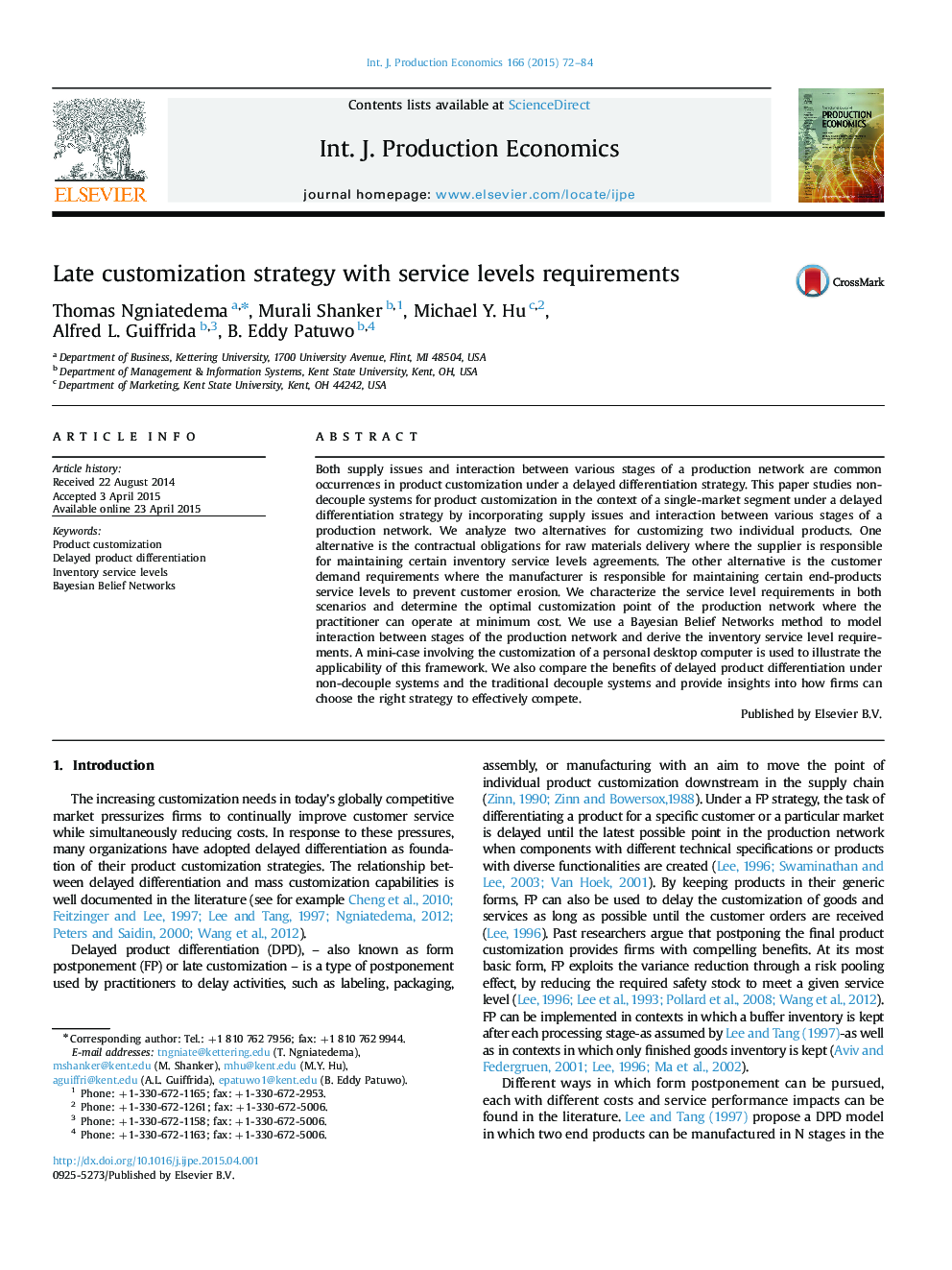| کد مقاله | کد نشریه | سال انتشار | مقاله انگلیسی | نسخه تمام متن |
|---|---|---|---|---|
| 5079673 | 1477546 | 2015 | 13 صفحه PDF | دانلود رایگان |
عنوان انگلیسی مقاله ISI
Late customization strategy with service levels requirements
ترجمه فارسی عنوان
استراتژی سفارشی سازی در اواخر با نیازهای خدماتی
دانلود مقاله + سفارش ترجمه
دانلود مقاله ISI انگلیسی
رایگان برای ایرانیان
کلمات کلیدی
شخصی سازی محصول، تمایز محصول تاخیر، سطح سرویس موجودی، شبکه های اعتقادی بیزی،
ترجمه چکیده
هر دو مسائل تامین و تعامل بین مراحل مختلف یک شبکه تولید، وقایع معمول در سفارشی سازی محصول تحت استراتژی تمایز با تاخیر است. در این مقاله سیستم های بدون جداسازی برای سفارشی سازی محصول در متن یک بخش تک بازار تحت استراتژی تمایز با تأخیر با در نظر گرفتن مسائل عرضه و تعامل بین مراحل مختلف یک شبکه تولید، مورد بررسی قرار می گیرد. ما دو گزینه برای سفارشی سازی دو محصول را تحلیل می کنیم. یک جایگزین، تعهدات قراردادی برای تحویل مواد اولیه است که تامین کننده مسئولیت حفظ توافق نامه های سطح خدمات موجودی را دارد. جایگزین دیگر الزامات تقاضای مشتری است که سازنده مسئول حفظ سطح خدمات خاصی است که برای جلوگیری از فرسایش مشتریان است. ما الزامات سطح خدمات در هر دو سناریو را مشخص می کنیم و نقطه مطلوب سازی شبکه تولید را تعیین می کنیم که در آن تمرین می تواند با کمترین هزینه کار کند. ما از روش شبکه اعتقادی بیزی برای مدل سازی تعامل بین مراحل شبکه تولید و استفاده از الزامات سطح سرویس موجودی استفاده می کنیم. یک مینی مورد مربوط به سفارشی سازی رایانه شخصی شخصی برای نشان دادن کاربرد این چارچوب استفاده می شود. ما همچنین مزایای تمایز محصول تاخیری را در سیستم های غیر جداسازی و سیستم های جداسازی سنتی مقایسه می کنیم و بینش هایی را در مورد اینکه شرکت ها می توانند از استراتژی مناسب برای رقابت مؤثر انتخاب کنند، مقایسه کنید.
موضوعات مرتبط
مهندسی و علوم پایه
سایر رشته های مهندسی
مهندسی صنعتی و تولید
چکیده انگلیسی
Both supply issues and interaction between various stages of a production network are common occurrences in product customization under a delayed differentiation strategy. This paper studies non-decouple systems for product customization in the context of a single-market segment under a delayed differentiation strategy by incorporating supply issues and interaction between various stages of a production network. We analyze two alternatives for customizing two individual products. One alternative is the contractual obligations for raw materials delivery where the supplier is responsible for maintaining certain inventory service levels agreements. The other alternative is the customer demand requirements where the manufacturer is responsible for maintaining certain end-products service levels to prevent customer erosion. We characterize the service level requirements in both scenarios and determine the optimal customization point of the production network where the practitioner can operate at minimum cost. We use a Bayesian Belief Networks method to model interaction between stages of the production network and derive the inventory service level requirements. A mini-case involving the customization of a personal desktop computer is used to illustrate the applicability of this framework. We also compare the benefits of delayed product differentiation under non-decouple systems and the traditional decouple systems and provide insights into how firms can choose the right strategy to effectively compete.
ناشر
Database: Elsevier - ScienceDirect (ساینس دایرکت)
Journal: International Journal of Production Economics - Volume 166, August 2015, Pages 72-84
Journal: International Journal of Production Economics - Volume 166, August 2015, Pages 72-84
نویسندگان
Thomas Ngniatedema, Murali Shanker, Michael Y. Hu, Alfred L. Guiffrida, B. Eddy Patuwo,
